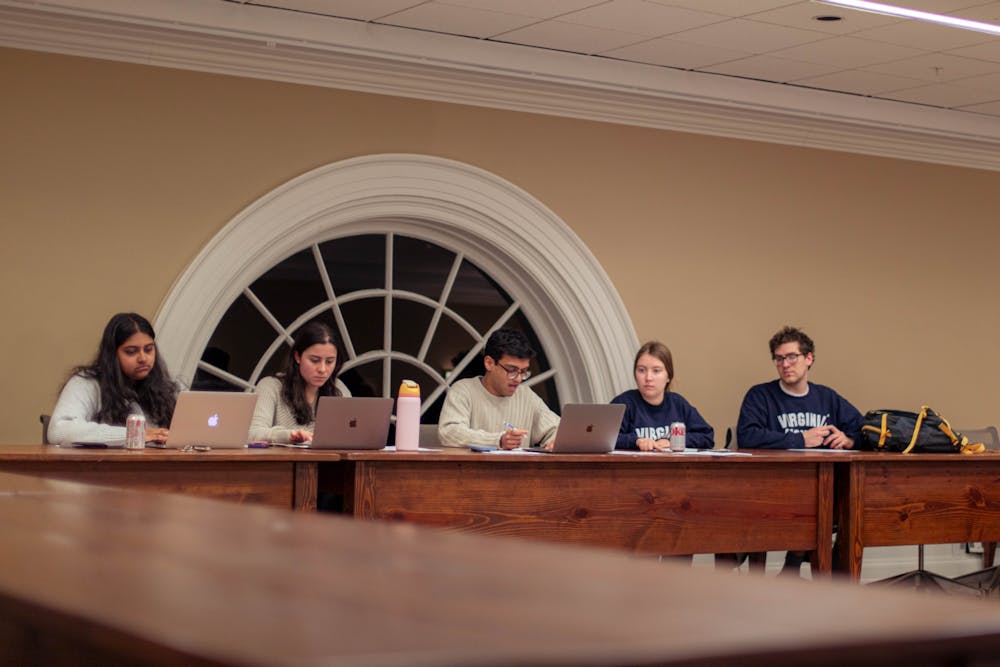The Honor Committee met Sunday to consider restructuring the responsibilities of the vice chair for the treasury and the vice chair for the graduate community, a topic that will be voted on next week. The Committee also discussed the five-hour voting period for the upcoming internal election in March.
There are six vice chairs on Honor’s executive committee, each responsible for different aspects of the Committee’s operations. One of the responsibilities possessed by the vice chair for the graduate community is educating the University’s graduate community on Honor procedures. The vice chair for the graduate community also leads the Community Relations and Diversity Advisory Committee.
CRDAC is a subcommittee that advises the Honor Committee on how to meet the needs of the University’s diverse graduate and undergraduate student body. A significant portion of this outreach happens through co-sponsorships — funding that the Committee provides to support Contracted Independent Organizations.
Hamza Aziz, chair of the Committee and fourth-year College student, said he envisions a broader role for Honor co-sponsorships beyond merely financial involvement. Aziz discussed options for restructuring the tasks of the CRDAC role to expand the impact and influence of the Committee’s co-sponsorships.
“[We should] make sure that there are actual partnerships forming from our co-sponsorships, and that they are not just passive opportunities for us to help us host events with other [organizations],” Aziz said.
Aziz said that the financial operations involved with co-sponsorships could be handed to the vice chair for the treasury — a role that was added last September through the Committee’s constitutional referendum — instead of falling under the purview of the vice chair for the graduate community.
In such an arrangement, Aziz said the vice chair for the graduate community and the vice chair for the undergraduate community could collaborate to assist the vice chair for the treasury as needed.
The vice chair for the treasury is tasked with overseeing and managing the Honor Committee’s finances — a role currently held by third-year Engineering student, Lukas Lehman. Lehman agreed with Aziz and said he hopes to see the vice chair for treasury role expanded.
“I thought this role might include a lot more of the co-sponsorship administration,” Lehman said. “I feel like it encompasses more, and to be able to delineate those tasks [in the bylaws] would also make sense.”
Tyler Sesker, vice chair for the graduate community, said the CRDAC role should be separate from the responsibilities of the executive committee.
“I think that it should be a completely separate role … [the CRDAC role] is an important position that can’t get the time and attention that it needs [in the current system],” Sesker said.
If the Committee detaches CRDAC from the vice chair for the graduate community position, it could be listed as an appointed position under the Committee’s bylaws, a document outlining the powers and practices of the Committee. Any changes to the vice chair responsibilities will be updated in these bylaws.
The Committee is currently discussing its structure to clarify roles before the internal executive committee elections in March. The elections are scheduled to take place at a Committee retreat from March 22-March 24 at Graves Mountain Lodge.
The Committee discussed the tentative schedule for the retreat. Committee members specifically discussed the time allotted for the election of the Committee chair. Currently, the schedule designates five hours for the election of the incoming Committee chair.
Committee representatives will vote on the new chair after candidate speeches, where the candidate can be called back for questioning multiple times throughout the five-hour period.
Law Rep. Daniel Elliott offered an argument against the five-hour election period.
“The way that we have done all of these elections in the past is wildly inefficient,” Elliott said. “After about 30 minutes of talking, everyone has made up their mind … there is nothing that anyone can say or do in three hours of question rounds that is going to make a difference.”
Nishita Ghanate, vice chair for investigations and fourth-year College student, recommended creating limits on the number of times that the chair candidate can be brought back for questioning.
“I think we [should] limit the [number of] times that we bring people back to a maximum of two times,” Ghanate said. “I do think that having an additional round of questioning was super helpful for people to make up their minds.”
The Committee adjourned their meeting at 8 p.m., and will continue to discuss the retreat schedule. They will meet next Sunday at 7 p.m. for the vote on the potential bylaw changes to vice chair responsibilities.







